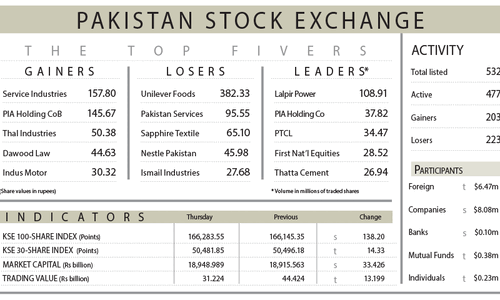• Says upcoming budgetary measures may have implications for near-term inflation outlook
• Industry says expensive borrowing has caused significant losses to economy
KARACHI: The State Bank of Pakistan (SBP) kept its key interest rate unchanged at 22 per cent for the seventh straight policy meeting on Monday as it found no improvement in the economic situation while the fear of inflation continues to haunt policymakers.
“The level of inflation is still high. The upcoming budgetary measures may have implications for the near-term inflation outlook,” the central bank said in its Monetary Policy Statement.
Most analysts and financial experts expected a cut in the interest rate, particularly due to poor economic growth. This decision comes in light of flat private sector borrowing, which has been significantly impacted by the high borrowing costs.
The Monetary Policy Committee (MPC) stressed the continuation of the current monetary policy stance to bring inflation down to the target range of 5pc to 7pc by September 2025.
The committee said the inflation outlook is susceptible to risks emanating from recent global oil price volatility, bottoming out of other commodity prices, the potential inflationary impact of the resolution of circular debt in the energy sector, and tax rate-driven fiscal consolidation going forward.
“Cognisant of these risks, the committee assessed that it is prudent to continue with the current monetary policy stance at this stage, with significant positive real interest rates,” it said. The committee views inflation to continue to remain on a downward trajectory, it added.
The MPC observed economic recovery during the first half of fiscal 2024, strong rebound in agriculture, sizeable surplus in current account in March, and inflation expectations of consumers inching up in April.
The SBP projected the 2023-24 GDP growth in the range of 2pc to 3pc, with 6.8pc agriculture growth (in the first half of the fiscal year). Large-scale manufacturing (LSM) showed no improvement to drive the economy this year. The LSM declined by 0.5 per cent during the eight months from July to February.
However, the MPC expects value-addition from the manufacturing and services sectors to recover in the coming months.
External sector
The current account has performed better than expected, recording a sizeable surplus of $619 million in March, mainly due to the Eid-related surge in workers’ remittances.
The current account deficit during July-March FY24 narrowed by 87.5pc to $0.5 billion compared to the same period last year. Exports continue to exhibit steady growth — led by rice — while imports have decreased due to better domestic agriculture output and moderate economic activity.
This reduction in the current account deficit — amid weak financial inflows — allowed the SBP to make sizeable debt repayments, including that of a $1bn Eurobond, while sustaining the SBP’s foreign exchange reserves around $8bn.
Fiscal sector
In line with fiscal consolidation efforts, the primary surplus increased to 1.8pc of GDP during July-January from 1.1pc in the same period last year. This improvement is mainly led by the continuous increases in revenue collection and some restraints on non-interest expenditures.
The sizeable increase in both tax and non-tax revenues largely reflects the impact of taxation measures and ongoing economic recovery. The interest payments, however, have increased due to high debt levels and the government’s reliance on expensive domestic borrowing.
“As a result, the overall deficit increased to 2.6pc of GDP during July-January FY24 from 2.3pc in the same period last year,” the SBP said.
Industry’s reaction
Iftikhar Ahmed Sheikh, president of the Karachi Chamber of Commerce and Industry, said the industry was expecting a reduction of 150 to 200 basis points in the interest rate due to declining inflation and support for economic growth from the IMF and World Bank.
He said the expensive borrowing rate has caused significant losses to the economy, particularly the cost of doing business, which has grossly suppressed the manufacturing sector.
Johar Ali Qandhari, president of the Korangi Association of Trade and Industry, also expressed serious concern over the State Bank’s decision to continue with the 22pc interest rate.
Fearing that such a move could be a disaster for the industry, Mr Qandhari asserted that the high interest rate posed a formidable barrier to achieving economic objectives, exacerbating challenges faced by businesses.
Published in Dawn, April 30th, 2024


































